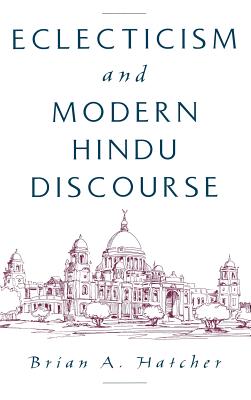

 Oxford University Press, USA
Oxford University Press, USA
Eclecticism & Modern Hindu Discourse


Key Metrics
- Brian a Hatcher
- Oxford University Press, USA
- Hardcover
- 9780195125382
- 9.36 X 6.38 X 0.76 inches
- 1.16 pounds
- Religion > Hinduism - General
- English
 Secure Transaction
Secure TransactionBook Description
By examining the development of Brahmo and Neo-Vedanta discourse, Hatcher is able both to problematize the notion of a monolithic concept of religious eclecticism and to reflect upon the various ways scholars might nevertheless attempt to make sense of a bewildering variety of eclectic philosophies. What emerges is not simply an attempt to refine our understanding of the role eclecticism has played in the modern Hindu context, but an extended reflection upon changing attitudes toward eclecticism in the West, from Diderot and Kant through postmodern critical theory. By investigating modern and postmodern perspectives on such issues as history, system, authenticity, and difference, Hatcher seeks to set in motion a dialectical approach to the study of eclectic world construction that balances the positivisitic confidence of modern scholarship with the playful exuberance of postmodern pastiche. Invoking the critical theories of Salman Rushdie, Theodor Adorno, and Richard Rorty, Hatcher advocates an approach to modern Hindu eclecticism that honors its creative poetics while retaining the critical distance necessary for judging its sometimes baleful fruits.
Author Bio
Brian Hatcher's research focuses on the transformation of Hinduism in colonial and contemporary South Asia, with a special interest in early colonial Bengal. His publications explore issues of religious reform, vernacular modernity, the work and significance of translation, and the colonial life of Sanskrit. An expert on the life and work of Ishvarchandra Vidyasagar, he is also known for his interpretations of "bourgeois Hinduism" and modern Hindu eclecticism.
His most recent book, Hinduism Before Reform (Harvard University Press, 2020), offers the first ever in-depth comparison of the early histories of the Swaminanarayan Sampraday and the Brahmo Samaj. When treated as modern Hindu reform movements, the Swaminanarayan Sampraday and the Brahmo Samaj tend to be trapped within normative frameworks structuring judgments about progress, Hindu modernity, and the place and role of religion in the Indian nation-state.
Hinduism Before Reform asks what we might discover if we were to compare the Swaminanarayan Sampraday and the Brahmo Samaj not as reform movements but as religious polities projected by two innovative religious lords active in the first quarter of the nineteenth century. What might we learn about the articulation of Hinduism during the early colonial period, and how might that enable us to rethink the eventual encompassment of the Swaminanarayan Sampraday and the Brahmo Samaj within an emergent "empire of reform" during the later nineteenth century?
For his next book-length project, Brian Hatcher is seeking to map the spread and chronicle the history of the Dasnami Sampraday in southwestern Bengal between the eighteenth century and the present. Combining field research with textual study, this project aims to chart the rise and fall of an influential set of religious actors who placed their stamp on the landscape and religious life of lower Bengal. Research for this project has been supported by fellowships from the American Institute of Indian Studies and the American Philosophical Society.
During the spring of 2019, Brian Hatcher was the J.P. and Beena Khaitan Visiting Fellow at the Oxford Centre for Hindu Studies.
Watch a video of Brian Hatcher's lecture Vidyasagar: Articulate Subject of the Non-Renaissance", delivered at Victoria Memorial Hall in Kolkata, India on September 28, 2019.
Research Interests
Hinduism and Religion in modern South Asia Religion and Colonialism
Modern Bengal
Education
PhD, Harvard University
MA, Harvard University
MDiv, Yale University
BA, Carleton College
Source: Tufts University
Videos
No Videos
Community reviews
Write a ReviewNo Community reviews